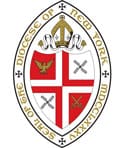Parish Records, Registers, Lists and Directories
Including retention period for records
Parish Register
Section 3 of National Canon 15 (Title III) and Diocesan Canon 22 (Section O) describe how the Parish Register is to be kept. It is the duty of every member of the Clergy to record in the Parish Register all Baptisms, Confirmations, Marriages, Burials, and the names of all Communicants within his or her Cure. When properly certified, the data contained in the Parish Register can be used as legal proof of birth, marriage, and death. The Parish Register is to be open to the Bishop for inspection during Episcopal visits to the parish.
Register of Services
A Register of Services is a record of all services (worship, baptism, marriages, and burials), and includes the date of the service, the names of the officiant/Lay Reader(s), the number of communicants at the Eucharist, comments, and special circumstances pertinent to a given service. It is the responsibility of the Priest or Warden to see that proper entries are made in the Register. The Register is to be opened to the Bishop for inspection during Episcopal visits to the parish.
List of Memorials
Provision should be made for the recording of all memorials. This list should contain such details as by whom the memorial was presented and for whom, the date, the designation, and any restrictions which may apply. Memorials are to be accepted by the Vestry and recorded by the Clerk.
Parish Records
A card file or a database program should be maintained containing a Parish Record for each family. This info is to contain pertinent data on each family: names, addresses, telephone numbers, head of household and spouse, the names and dates of birth of all children; how and when received into communion (transferred/confirmed); status (Baptized, Confirmed, Communicant) of each family member; occupation of head of household; date of marriage; whether removed by transfer, death, etc., and date.
Info may also contain a record of visitations, vocational skills and interests, information as to where transferred, and other notations not contained in the Parish Register. Information may also be used to develop a “resource bank” for the parish, to keep in touch with visitors, as “calling cards” for the Every-Member Canvass, and other needs as a given parish might find appropriate.
Information contained in parish records is “privileged” information, and should therefore be used with pastoral care and sensitivity.
The data should contain information on the children of the Sunday School: names, addresses, names of parents, age of child, status as to Baptized and Confirmed, and other information teachers or the Superintendent would find useful.
Mailing List/Parish Directory
For good communication it is important that an up-to-date mailing list and church directory be kept. When appropriate in the judgment of the Rector and vestry, a copy of the Church Directory containing names, addresses, and telephone numbers of each family may be made available to members of the parish.
Files
Rectors and Priests-in-Charge may find it useful to organize their files along the following lines:
a. Tickler File. Contains items marked ahead for a given date.
b. Temporary File. Contains items where the decision to place in the regular Subject File is postponed. The Temporary File is reviewed at the end of the second month. (Experience shows that at least 95% of the items are discarded at that time.)
c. Hold File. Contains items for review once a week.
d. Chrono File. Contains, in binders, one copy of each outgoing letter and memo, in chronological order (Invaluable, when an item cannot be found anywhere else.)
e. Circulating File. A packet of copies of non-confidential letters and memos, circulated daily among staff members for their information.
f. Confidential File. Kept in a separate and secure place.
g. Regular Subject Files (active, and in storage).
Retention Periods for Records
There is some flexibility possible in the establishment of the minimum length of time certain classes of records should be retained. A formal retention program should be set by each parish. The retention periods suggested below commerce on January 1 of the year in which the class of records becomes non-current.
Retain Permanently
For this class of records, storage is recommended in a fireproof safe, fireproof vault, or fireproof filing cabinet.
- Books of original entry
- By-laws
- Cash receipts records
- Certificates of incorporation
- Certified financial statements
- Charter
- Check disbursement records
- Constitution
- Deeds
- Documents establishing endowments
- Easements
- Insurance Policies
- Minutes, including resolutions, of Vestry meetings
- Pension/Retirement Plan records, including deduction authorizations
- Plans
- Property
- Purchases
- Sales
- Specifications
- Title Papers
Retain 10 Years
- After Cancellation/Termination:
- Agreements
- Contracts
- Voucher registers
- Workers’ Compensation reports
Retain 7 Years
-
- Accident reports
- Brokerage slips for securities
- Building repair records
- Cancelled notes
- After termination:
- Individual employee earnings records
- Employee applications
- Payments and reports to all levels of Government, including for taxes
- Employee contracts
- Employee service records
- Purchase invoices
- Group insurance records
- Uncollectible accounts records
- Individual employee personnel files
- W-2 forms
- Salary and wage rate changes
- Unemployment claims
- Withholding exemption certificates
Retain 6 Years
- Disability records
- After expiration/cancellation:
- Fire damage reports
- Leases
- Sick benefit records
- After expiration/termination:
- Contracts with vendors
- Mortgages
Retain 5 Years
- Records of pledges.
Retain 4 Years
- Accounts payable:
- Employee expense reports
- Invoices
- Old Age Benefit reports
- Credits
- Payroll registers, gross and net
- Cancelled voucher checks
- Purchase orders, filled and unfilled
- Drafts paid
Retain 3 Years
- After expiration:
- Expenditure appropriations
- Equipment repair records
- Expenditure authorizations
- Surety bonds
- Monthly financial statements
- After termination
- Petty cash records
- Fidelity bonds of employees
- Receiving reports
Retain 2 Years
- Bank statements
- Void checks
- Bank reconciliations
- After settlement/termination:
- Budgets
- Assignments of payroll
- Cancelled payroll checks
- Attachments of payroll
- Comparison budgets
- Garnishments of payroll
- Deposit books
- After termination:
- Deposit slips
- Employee deduction authorizations
- Expense analyses
- “Add to payroll” notices
- Stop payment notices
- Discharges
- Time cards
- Time sheets
Retain 1 Year
- After termination:
- Quotations acted upon
- Licenses
Retain Until Completion
- Acknowledgments of orders
Finance and Administration Contacts
Ms. Karin Almquist
Controller
Office: 212-316-7534
kalmquist@dioceseny.org
Ms. Chontel Simmons
Director of Operations and Human Resources
Mr. Robert Santiago
Senior Accounting Manager
Office: 212-316-7451
rsantiago@dioceseny.org
Ms. Michele Kearney
Executive Director, DIT
Office: 212-932-7312
Fax: 212-316-7405
mkearney@dioceseny.org
Ms. Sara Saavedra
Convention Officer, Assistant Secretary of Convention, Diocesan Benefits Coordinator, Secretary to the Standing Committee
Office: 212-316-7423
Fax: 212-316-7420
ssaavedra@dioceseny.org
Ms. Mildney (Mai) Dal
Senior Accountant
Office: 212-316-7434
Fax: 212-932-7328
mdal@dioceseny.org
Ms. Zoraida Marte
Payroll Manager
Office: 212-316-7478
Fax: 212-932-7328
zmarte@dioceseny.org
Ms. Charmagne Castillo
Staff Accountant
Office: 212-316-7435
Fax: 212-932-7328
ccastillo@dioceseny.org
Mr. Lukasz Krukowski
Junior Accountant – Accounts Receivable
Office: 212-316-7479
lkrukowski@dioceseny.org
Mr. Andrew Gary
Assistant to the Chief of Finance and Operations, Communications & Editorial Assistant
Office: 212-932-7322
Fax: 212-932-7323
agary@dioceseny.org
Files and Downloads
Search










